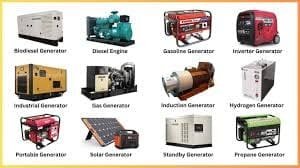Meta Description: Learn the various kinds of generators that are in the horizon in 2025 such as portable, standby, solar, and fuel cell types, which can help during power outages . Our informative guide will teach you which type of a generator is going to be suitable to your power requirements, budget and application.
The loss of power may occur at any moment, which is why home and business can benefit greatly by having a generator that can provide backup power , as well as outdoor recreational facilities. With various generator types available in today’s market, choosing the right one can be overwhelming. This guide covers all the different types of generators on the market, so you are in a position to make an informed decision on the kind of generator to purchase depending on the needs you have, the amount you have to spend and the purpose you have it.
At GWT Worldwide, a specialist global logistics service provider in providing global freight forwarding and supply chain services to businesses across the world, we are aware that the use of reliable power system that converts mechanical energy within the businesses is very vital. Chances are that we are good at international shipping and customs clearance so that the generator parts and equipment are delivered to their destinations in a safe and efficient way.
What Are Generators and Why Do You Need One?
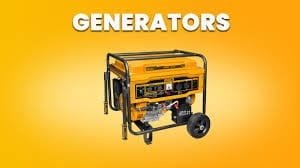
Generators: This is a mechanical electric power equipment that takes mechanical power and converts it into electrical power used in an outage situation or in an area where the primary electrical power is not available. They operate through the application of an internal combustion engine that spins an alternator to generate electricity that may be used with such equipment as appliances, tools or even an entire home or business.
The new generators are not only more efficient; they are also fuel efficient, have lesser noise, less pollution to the environment and they are also friendlier. Knowledge about the various ones will enable you to choose the best that suits your requirements.
Portable Generators: The Most Versatile Power Solution
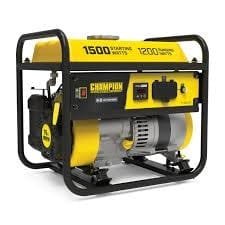
The most commonly used form of generator is the portable generators because they have wide application flexibility and are cheaper. These are normally between 1000 and 10,000 watts, capable to produce electricity and they are transportable to other sites easily.
Some of their main strengths are that they are mobile, relatively cheaper and operate more than one device at a time. With new models testing in 2025, newer portable generators, as well as hydrogen generators, are more efficient than ever and dual-fueled, showing them to be more versatile than in the past.
Nevertheless, portable generators take some manual activation, and they have to be refilled with fuel; also, they should be used outside because of the emission of carbon monoxide. They’re ideal for camping, construction sites, emergency backup power, and outdoor events.
Standby Generators: Automatic Whole-House Power Protection
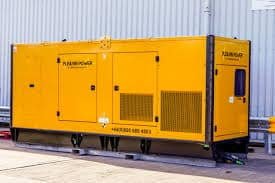
Whole-house generators (also called standby generators) are used to offer automatic backup of entire residences or companies. These home standby generators are permanently installed units that connect directly to your home’s electrical panel and natural gas or propane supply.
Standby generators are automatic and they provide around-the-clock-all-year support and they start powering in seconds after an outage is identified. They are capable of supplying the whole house including air conditioning system, heating systems and all electrical appliances without the need of manual control.
Its key disadvantages are the elevated one-time expenses, professional installations, and the necessity to maintain. But to those customers who are in need of effortless power protection and comfort, there cannot be a better alternative than the standby generators.
Inverter Generators: Clean Power for Sensitive Electronics
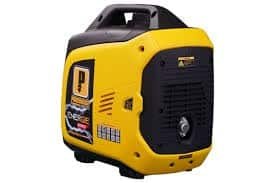
Inverter generators generate clean stable electric power that can even be used in sensitive electronic appliances such as computers, smart phones, and in the medical industry. Such generators, including solar generators produce, are more expensive than the portable ones but are more efficient and have a longer runnier and less noisy nature.
The inverter technology feeds AC power to DC and then again to clean AC power and alleviates the problem of voltage fluctuations causing damage to electronics. They’re significantly quieter than conventional generators and offer better fuel efficiency.
More recent tests revealed that current inverter generators such as the Westinghouse iGen4500 are extremely calculable with their portability, efficiency, and even remote functionality, becoming more frequently used at residential and recreational areas.
Solar Generators: Harnessing Renewable Energy
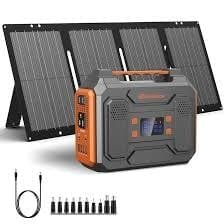
Solar generators, also known as mobile power stations, are self-sustainable and do not have fuel components as they require the use of photovoltaic panels to charge the internal batteries supplying power, which is running clean and noise-free prevent carbon monoxide poisoning. These green units, which often utilize solar panels, have become popular with the advent of environmental concerns and the advancement in the technology of solar units.
Contemporary solar generators such as the Bluetti AC500 Power Station having expandable batteries can have large capacities to meet long use power requirements. They’re perfect for camping, emergency preparedness, and off-grid living situations electric service
.
Although the cost of solar generators is quite expensive and charging can only come when it has sunlight, they produce no sound, produce no emissions and they require minuscule maintenance. They’re ideal for environmentally conscious users and situations where noise must be minimized.
Diesel Generators: Heavy-Duty Industrial Power outages
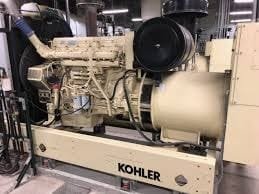
The diesel generators are optimally used in the industrial and commercial fields where higher power output and longer performance are necessary. These powerful machines have superb fuel consumption, wear and tear as well as endurance in comparison to gasoline operated models generator outdoors
.
Diesel generators are also more cost effective to use in full time duty, as each gallon produces more kilowatts of power and service is also less frequent. They’re commonly used in hospitals, data centers, construction sites, and remote industrial facilities more power.
The key drawbacks are an increased price on entry, noise, and more difficult maintenance industry. Besides, diesel fuel is subject to gel development at low temperatures and also subjected to storage constraints.
Natural Gas Generators: Clean and Convenient Fuel Source
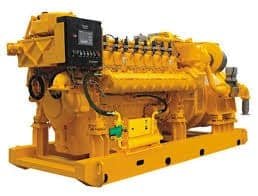
Natural gas generators connect directly to your home’s natural gas supply, eliminating fuel storage concerns and providing virtually unlimited runtime during extended outages. They are more helpful to the environment because they generate less emissions as compared to gasoline or diesel generators.
The natural gas is easily accessible in most of the urban and suburbs that makes using the generators convenient and reliable. They are normally also cheaper to run and maintain than a gasoline powered generator and their fuel also burns cleaner.
Nevertheless, there is a possibility that natural gas generators suffer lesser power generation during such times of extreme cold and are to be installed by professionals. They’re also dependent on the natural gas utility remaining operational during disasters.
Propane Generators: Clean-Burning and Reliable
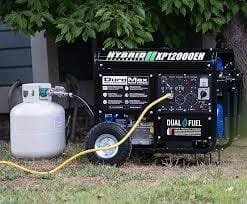
The propane generators can provide clean burning, long life fuel storage and high levels of consistent performance in a variety of weather conditions. Propane doesn’t degrade over time like gasoline, making it ideal for emergency preparedness and infrequent use, similar to biodiesel generators .
Such generators give less emissions compared to those using gasoline and activate every time under cold storage. Propane is common and can even be stored and used within years without fading.
The primary disadvantages are increased fuel expenses and propane tanks exchange or filling. Nevertheless, most of the current standby models do have the dual-fuel option providing flexibility to run on both propane and gasoline.
Gasoline Generators: Traditional and Widely Available
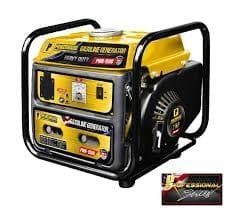
The prices of gasoline generators are still attractive and they can be found all over because of fuel availability. The gasoline can be conveniently refueled in the outage or when one is traveling easily, while stationary generators offer a different approach.
Such generators usually have good power to size ratio and come in a wide variety of types and brands. They’re suitable for occasional use and emergency backup power needs.
Nevertheless, gasoline has a short storage, and unlike other alternative fuels, gasoline needs fuel stabilizers to be stored for a long period of time. Besides, gasoline generates more emissions compared to other fuels. Gasoline generators are very needy in as far as maintenance is concerned as compared to certain others.
Dual-Fuel and Tri-Fuel Generators: Maximum Flexibility
The Dual fuel and tri fuel generators have the advantage of flexibility in choice of fuel and hence the generators can be used as alternatives when one of the fuels is unavailable. Recent models such as the Pulsar 7,250 W Dual-Fuel Inverter Generator have greater versatility than single-fuel generators.
Such generators normally run using a mixture of natural gas, propane, and gasoline and users can then be able to use most convenient or cost effective fuel type. Such versatility can cost a lot when one is stuck in long outages, or where fuel is scarce when one is moving to a different destination.
Although the initial cost of dual-fuel and tri-fuel generators is higher in comparison to purely diesel generators, they insure serenity of mind and accessibility in operation, which renders their price a worthwhile investment in the use of several users.
Fuel Cell Generators: The Future of Clean Power
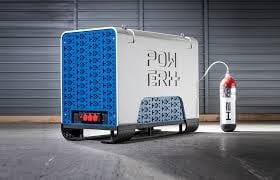
The fuel cell generators are the type of advanced technology that transforms hydrogen into electricity using electrochemical process and leaving as the only byproducts water and heat. Contemporary hydrogen fuel cell generators are made to substitute diesel or gas generators in mobile, prime, and emergency standby, with no emits all.
Hydrogen fuel cells, on the other hand with regards to diesel generators, do not contain any intricate parts of work and can only be composed of an anode, a cathode and an electrolyte, which makes them resist remarkably low maintenance. The technology is silent and does not have any harmful emissions with high efficiency.
The major obstacles are start up and heavy capital investment and lack of hydrogen infrastructure. Nevertheless, with allowing new technologies, and with promises of the increasing accessibility and availability of hydrogen, the role of fuel cell generators is to be of greater significant in clean power production.
Hydroelectric Generators: Harnessing Water Power
Micro-hydro systems or hydroelectric generators depends on the flow of water to create electricity in isolated or distant places along the streamside or rivers. Such machines supply steady power rate so far as there is sufficient water flow.
Micro hydro power plants would be capable of supplying electricity to small communities (one home or a few ones) in rural regions where there is the appropriate source of water. When carefully set up, they provide trusted power generation and produce few impacts to the environment.
The installation must be done in specific geographic conditions and it might require some permits or environmental impacts. But in case of appropriate sites, hydroelectric generators will be sustainable and long terms source of power.
Wind Generators: Capturing Wind Energy
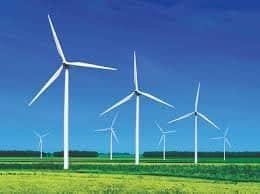
Small wind turbines or wind generators are turbines used to generate electricity for house holds or small scale commerce power lines. The systems operate optimally in regions that have steady winds of a speed of more than 10mph carbon monoxide detectors.
The small wind turbines manufactured today are more efficient and less noisy than the previous ones. They could be combined with other sources of power or act as the main source of power in windy sites.
Wind generators need sufficient wind energy, good location and should be permitted to be installed in certain jurisdictions. They’re most effective when combined with other renewable energy sources in hybrid systems.
Backup Power Systems vs. Primary Power Sources
The knowledge of the difference between the backup and principal power applications contributes to the best choice of the type of generator temporary power. During outages the backup systems come into operation to ensure essentials are sustained and in places not connected to the grid primary systems come into operations to ensure continuous power.
The backup systems are more concerned with reliability and an automatic operation, and so stand by generators are the best suited here. The more primary power applications prefer to have long run time and fuel efficiency and diesel or renewable energy systems are preferred natural gas line.
Applications in commercial and industrial generation Commercial and industrial generator applications include emergency power generation, standby power generation, power backup, and transitional power. Commercial and industrial generation applications
Commercial and Industrial Generator Applications
Other regulations have to be met more often than not by industrial generators in relation to emissions, noise and safety. They can also require special features such as load banks to test the system, automatic transfer switches and remote monitoring electric generator.
Other regulations have to be met more often than not by industrial generators in relation to emissions, noise and safety. They can also require special features such as load banks to test the system, automatic transfer switches and remote monitoring produce power.
To commercial customers, selecting among the various types of generators involves consideration of power needs, the requirement of run-time, selection of the fuel to be used, environment policies as well as the capabilities to undertake the maintenance of the generator hydrogen gas.
Choosing the Right Generator Size and Capacity
To determine the size of the generator you want, you have to add the total costs of all your power requirements such as starting watts of appliances powered by motors. Generators that are too small to carry out the load and ones that are too large burn the fuel electrical generator, and unnecessary amounts of money.
Things of vital importance such as refrigerators, medical equipment and communication device must be considered as minimum requirements of power. Air conditioning and electric heating, which are optional features, require a lot of power too.
Prosperity load calculation can assist in properly 7zening, particularly, in the case of whole-house systems. When calculating your power needs, count both running watts and starting watts.
Environmental Impact and Emissions Considerations diesel fuel
Green issues are playing a more significant part in generator selection and emission laws are becoming tighter and consumer education is on the rise. Different types of generators have different emission values as well as environmental impact, which emphasizes the need for proper generator maintenance electrical energy.
The solar and fuel cell generators do not emit any direct pollution, whereas the natural gas and propane generators burn cleaner than the gasoline or diesel ones emulsified diesel generators. More recent generators have also taken environment friendly emission control measures.
There are environmental consequences of selecting your generator such as transportation of the fuel, storage necessities and used components disposal; each of these factors needs to be considered during the selection process induction generators.
Maintenance Requirements and Operational Costs
Maintenance costs of generators differ greatly depending on the type it has and it will affect the expense of long-term ownership. Portable generators should be periodically changed of oil, filters changed in the air, and prepared at the changing seasons, and standby units should receive expert maintenance stable power supply.
Fuel cost is a major operation expense and efficiency depending on the type of generator can influence long term operation costs. The solar generators are inexpensive to maintain, but expensive to purchase.
When considering the total cost of operations of various generators, consider maintenance costs, fuel costs, and necessity to be repaired backup power source.
Conclusion
Choosing the appropriate type of a generator is the complex task that must take into account your particular power requirements, financial allowances and planned uses. Portable generators are flexible and cost-effective when used periodically and standby generators are convenient to protect essential appliances in the entire home. Inverter types are ideal on sensitive electronics, and eco-friendly types, such as solar generators, are clean and quiet.
Newer alternatives such as use of fuel cell generators are even cleaner and efficient sources of power generation as technology keeps on advancing. Either you require a backup system in case of emergency, or primary power in far away areas or some portable power to use out in the open, knowing your options with the generators will help you to make an informed decision.

